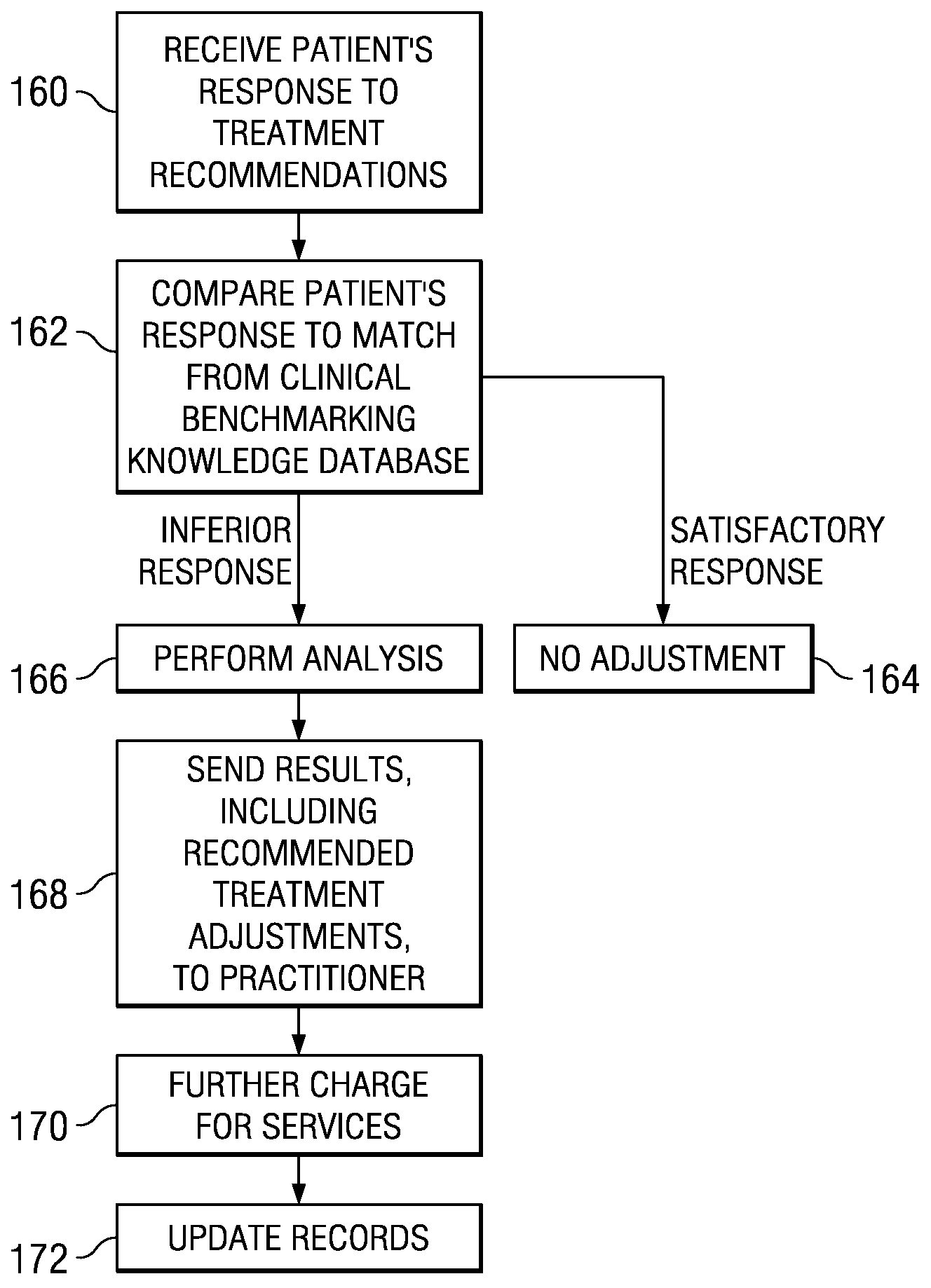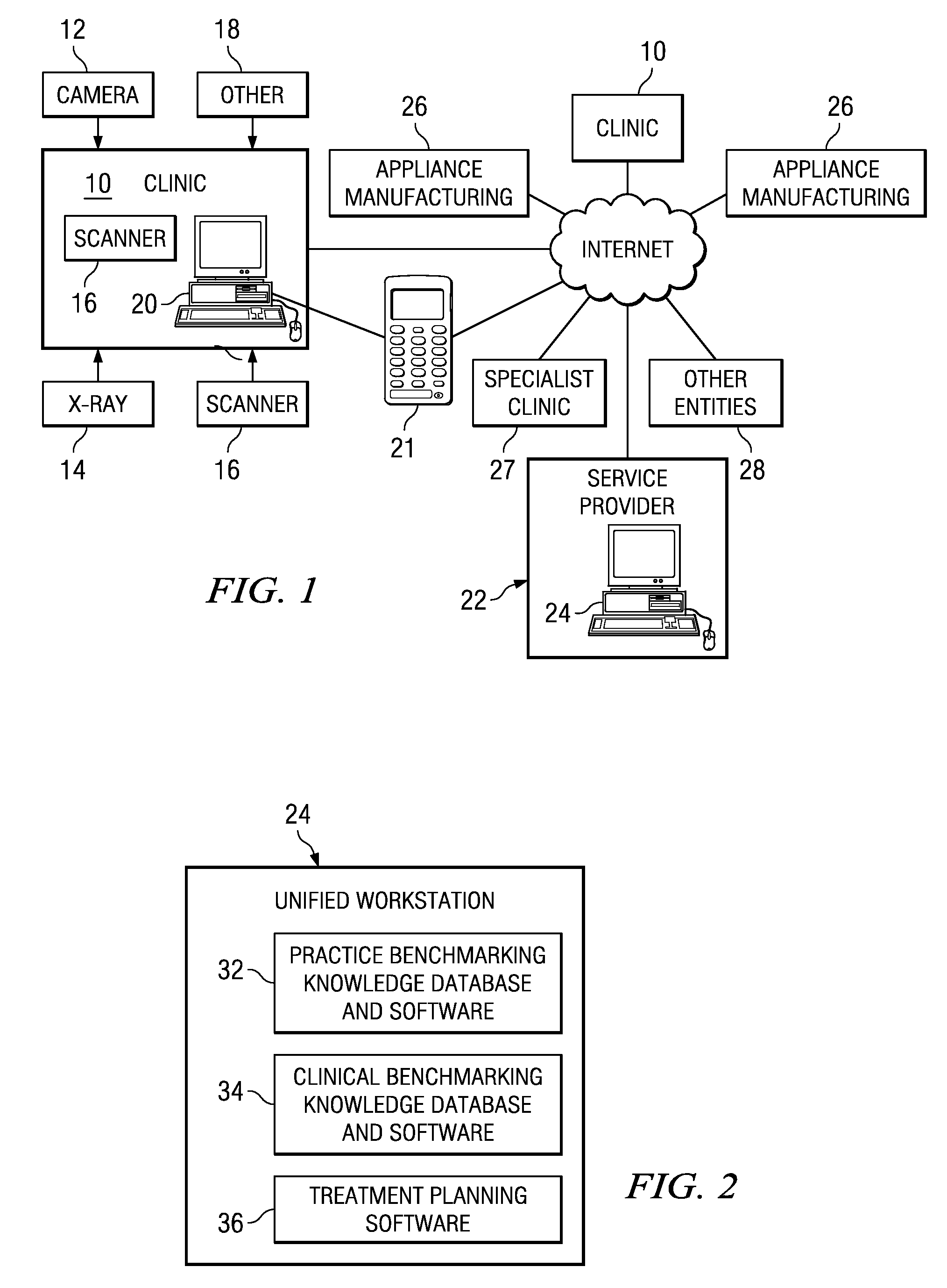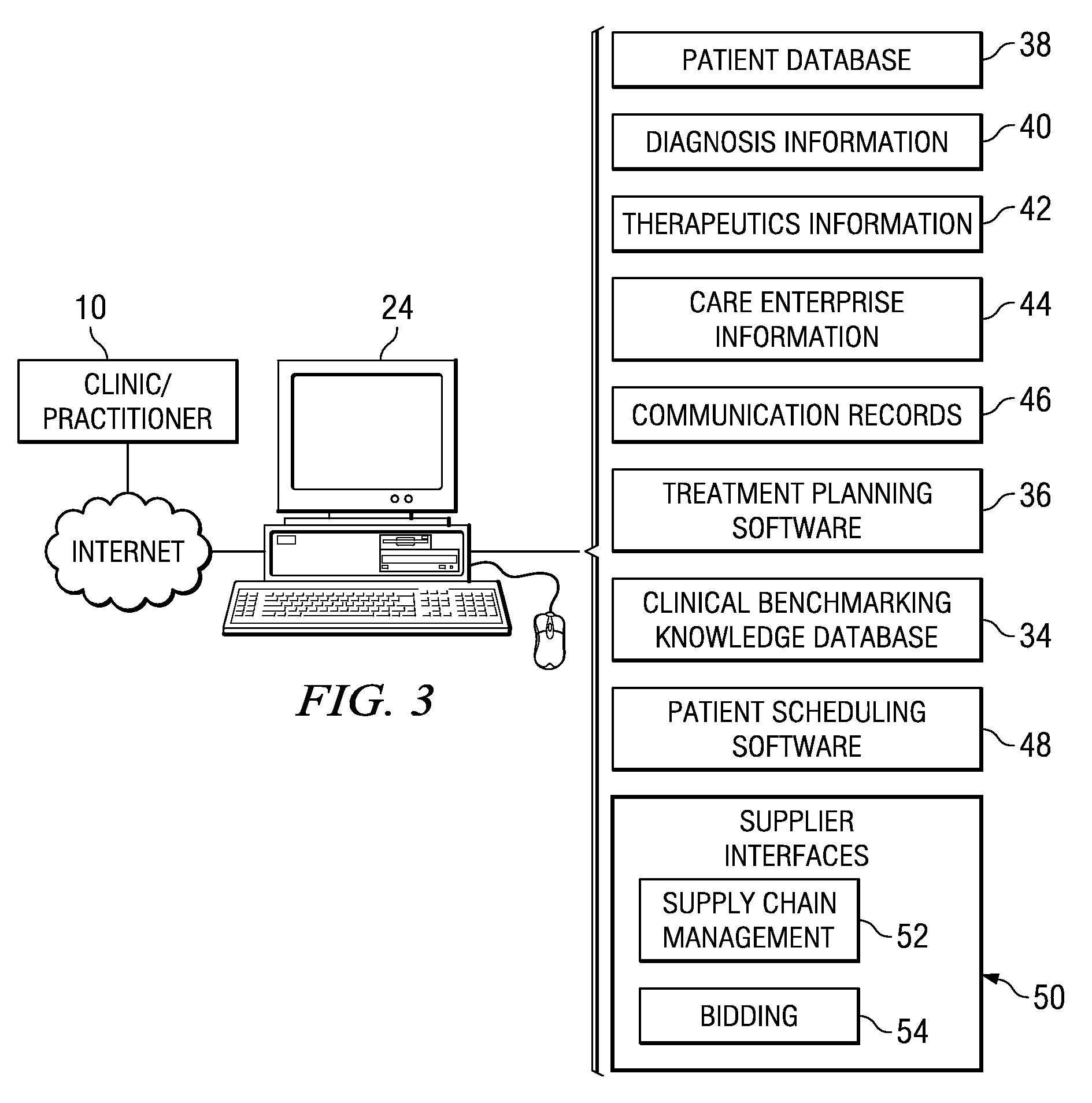[0010]In a first embodiment of the invention, the unified workstation facilitates benchmarking practitioner's practice from a business perspective. The workstation maintains a central repository of a practice benchmarking database comprising contemporary performance data from industry standard practices, including, for example, data from superior performing practices, data from educational institutions, data from care institutions, etc. The evaluation of the practice is performed by comparing certain performance metrics for the practice of interest against those of the comparable industry standards; analyzing the differences; reporting the results, and, when the differences indicate inferior performance by the practice of interest in one or more areas, identifying appropriate corrective actions.
[0011]In another embodiment of the invention, the unified workstation facilitates selection of an initial treatment plan with the help of a clinical benchmarking database. The method relies upon the use of the clinical benchmarking database, which is created by storing the clinical treatment history of individual patients coupled with a variety of other types of information, such as demographic information concerning patients, practitioners, practice-staff, diagnosis and therapeutics information, the results of patient survey regarding satisfaction with treatment, pain experienced during treatment, reference literature, workflow processes, instrumentation information, etc. Patient diagnosis and characteristics are compared with those in the clinical benchmarking database, and a selection is made of one or more suitable reference treatments. The results are then presented to the practitioner. The practitioner discusses the treatment options with the patient, and, in concurrence with the patient, selects the one that most satisfies the patient needs and constraints, such as the importance the patient places on esthetics in relation to the associated treatment expenditure, patient's insurance coverage, and other similar factors.
[0012]In yet another embodiment of the invention, the unified workstation facilitates periodic, ongoing evaluation of a patient's actual, monitored progress in response to the prescribed treatment with the help of the clinical benchmarking database comprising clinical treatment histories and characteristics of a large number of patients. From the database, a reference patient and associated treatment plan that come closest to the patient of interest are chosen. Then, the patient's progress at the particular point in time in the treatment course, e.g. individual tooth movement, is compared against the progress for the reference patient at a comparable elapsed time in the reference patient's treatment, and the results given to the practitioner. In the instances where the actual response matches the expected response, the knowledge so gained could be added to the clinical benchmarking database. Furthermore, if the patient's progress is found to be lagging significantly behind that of the selected reference patient, a root cause analysis is performed to identify the source of the problem. The source of the problem could be either the prescribed treatment or the patient behavior. If the treatment is found lacking, appropriate corrective actions are suggested to the practitioner. On the other hand, if it is determined that the patient might not be adhering to the prescribed treatment regimen, then patient counseling is recommended to the practitioner.
[0013]This is a closed-loop approach wherein the actual response to the treatment is utilized in deciding the future course of action. In particular embodiments, the invention can be used to predict the treatment response, such as the tooth-movement behavior. This predicted tooth movement behavior can be used for calendar management for facilitating scheduling of patient's future visits to the practitioner's clinic, and sending out reminders. Moreover, the clinical benchmarking knowledge database supports the use of intelligent queries of the database to seek information regarding practice-related issues, using known database query languages. In the current practice, orthodontists largely rely upon trial and error methods and intuition, and function in a reactive rather than a proactive manner, to make corrective adjustments, which approach may not be the most efficient for delivering care to the patients. A major benefit of the innovative approach proposed herein is that it facilitates consistent and far more effective, evidence based care that closely matches the patient needs, than the traditional hit-and-miss anecdotal care that heavily relies upon experience for success. In turn, this approach leads to much faster, and cost-effective acquisition of the target disposition of the patient, when compared to the traditional approach. Yet another benefit is that the unified workstation facilitates increased productivity from the practitioner and the practitioner's staff, enabling reduction of cost in the delivery of the patient care. Another aspect of this invention is that it enables the practitioner to develop benchmarks personalized to individual patients.
[0015]In yet another embodiment of the invention, the unified workstation offers application specific databases (clinical knowledge database), application specific computerized modeling and simulation tools, and interfaces for accessing other resources in order to facilitate and enable a variety of functionalities and services. These functions and services could include, for example, intelligent queries of the database, seeking information from reference treatments, accessing reference information, meta-analysis of patient studies, etc. These functions would also preferably include software developing a comprehensive treatment plan that is tailored to satisfy patient-specific needs, such as diagnosis, therapeutics planning, and care monitoring and management. Additionally, the software provides the ability to identifying a reference patient in the clinical benchmarking knowledge database that matches, at least approximately, the orthodontic condition of the patient. The software further provides a function of obtaining and using data comprising the condition of the patient during the course of treatment (such as scan data from a scan of the patient's dentition during the course of treatment) and thereby monitoring the progress of the patient in response to the treatment and comparing the monitored progress to an expected progress for the patient. Once the treatment is in progress, the workstation thus provides the capability of periodically monitoring the actual patient response to the treatment, comparing it against the predicted performance, and evaluating the differences between the actual response and the expected response, and in the event that the actual response is unsatisfactory. In preferred embodiments, the software may assist the practitioner or user of the workstation in the performing of a root cause analysis to identify the source of the problem and taking appropriate corrective actions such as adjusting the treatment or counseling the patient.
[0040]Thus, in the broader aspects, we have invented an interactive, unified workstation that not only unifies in a single system multitude of functionalities pertaining to a practitioner's practice that would otherwise require disjointed, more expensive, and less efficient individual workstations dedicated to a specific, limited task or a sub-set of tasks, but also provides additional novel and comprehensive functionalities that would revolutionize the medical, dental, and orthodontic practices and vastly improve the delivery of care to patients in a manner that truly satisfies their needs. The invention is directed towards benchmarking for a practitioner's business practice, as well as for clinical aspects of initial and ongoing treatment planning, towards enabling a variety of novel functionalities and services and integrating overall patient care planning functions, including planning for hybrid treatment.
 Login to View More
Login to View More  Login to View More
Login to View More 


